Agentic AI for Claims Processing

Sample Claims Processing Workflow
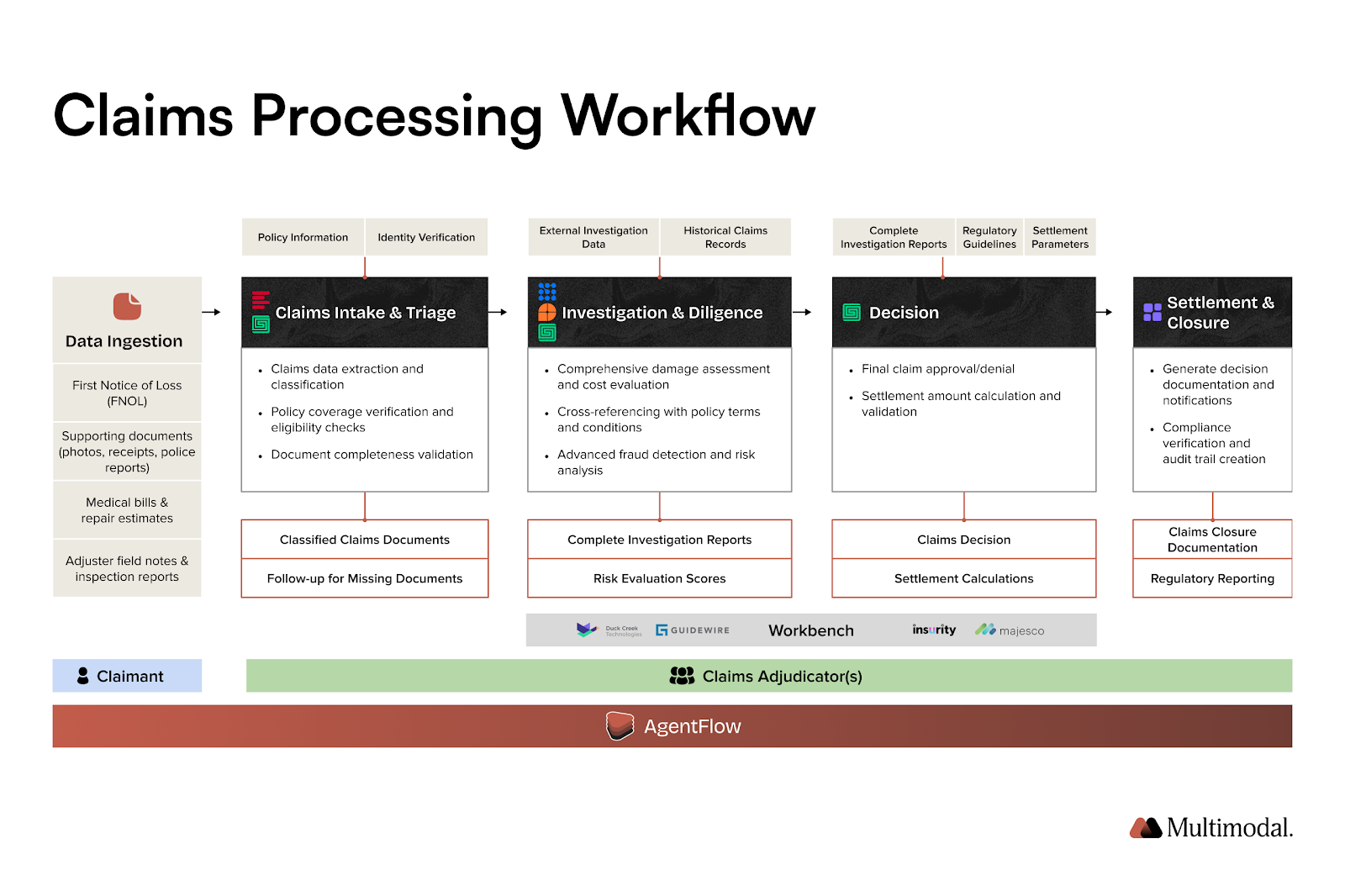
This is a representative workflow. Multimodal’s agentic AI can adapt to your team’s specific systems, steps, and priorities.
Claims processing is a core function for insurance carriers, spanning intake, triage, investigation, decisioning, and final settlement. But today, many teams still rely on manual reviews, disconnected systems, and slow handoffs across departments.
The workflow above shows a representative path from FNOL (First Notice of Loss) through to closure. It includes document classification, data verification, coverage checks, risk scoring, decision support, and compliance reporting.
Each step is vital to operational efficiency, regulatory compliance, and customer satisfaction, yet often slowed by fragmented tooling and human bottlenecks.
Below, we break down how AgentFlow applies intelligent agents to reduce effort, improve accuracy, and accelerate outcomes across the claims lifecycle.
Augmenting Claims Processing With AgentFlow
1. Claims Intake and Triage
Before AgentFlow: Claims teams manually collect FNOL packets, review policyholder information, verify coverage, and ensure documentation is complete. Intake staff often jump between portals, spreadsheets, and legacy systems to classify and route claims appropriately.
With AgentFlow: Document AII automatically extracts data from FNOL packets, classifies claims by type, and flags incomplete or mismatched documents. Decision AI checks coverage eligibility by referencing policy rules and historical approvals.
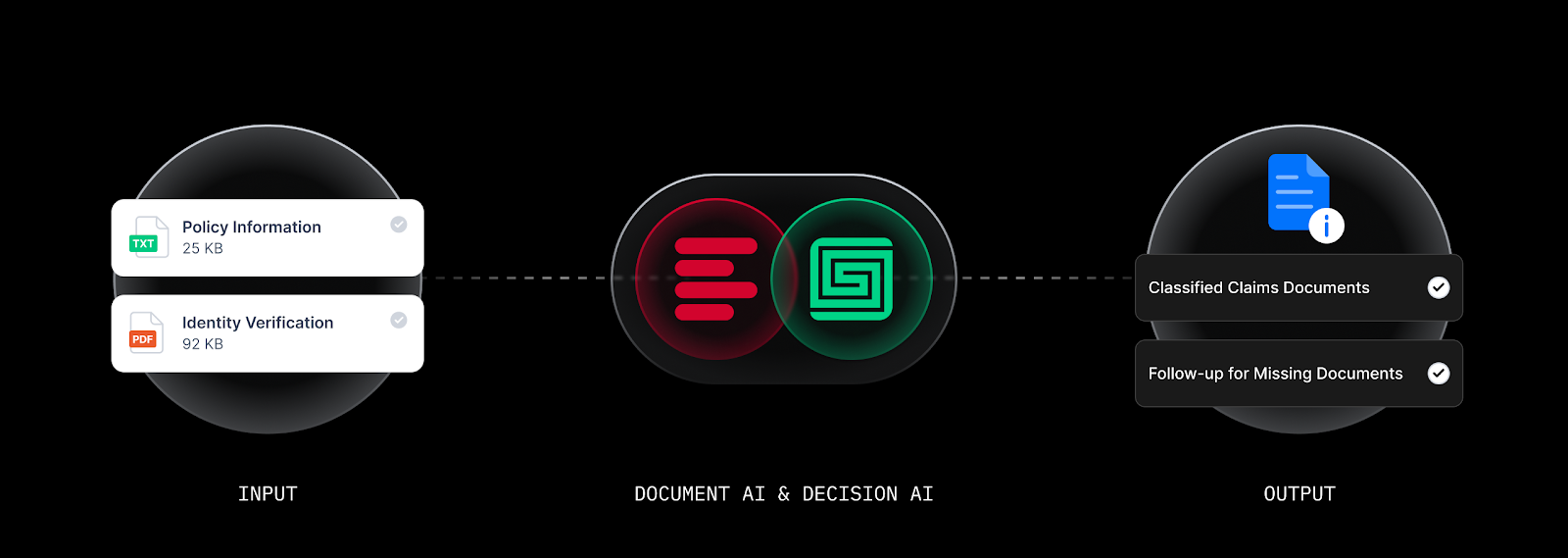
Value: Faster triage, fewer errors, and clean, structured case files handed off for investigation, reducing rework and accelerating cycle times.
2. Investigation and Diligence
Before AgentFlow: Claims handlers gather evidence, review historical data, and validate information across disconnected claims processing systems. Fraudulent claims are hard to catch and complex claims often require escalation.
With AgentFlow: Conversational AI enables natural language processing (NLP) to surface relevant data quickly. Database AI retrieves structured data for case validation. Decision AI assists with fraud detection and risk scoring based on past claims and policy parameters.
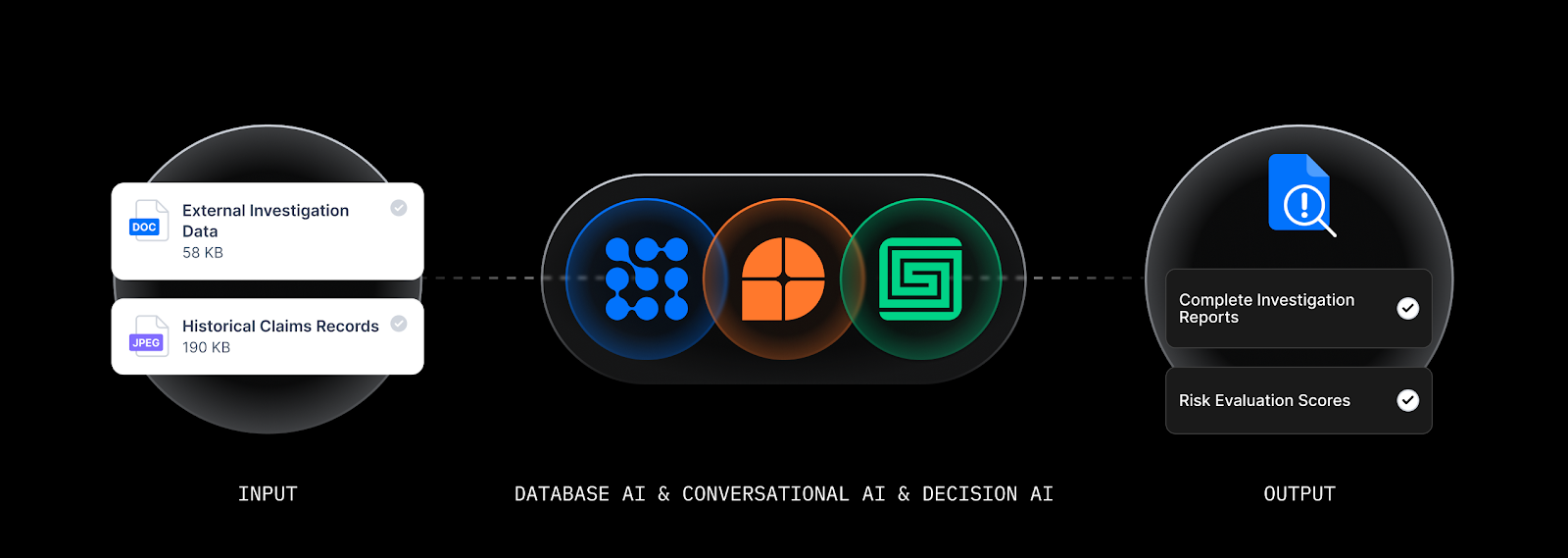
Value: Automating claims investigation enables faster, more accurate assessments. Processors can handle more complex claims without additional headcount, improving throughput and fraud prevention.
3. Decision
Before AgentFlow: Claim adjusters manually assess damages, evaluate eligibility, and determine approval. The process is slow and susceptible to human error, especially in high-volume claims environments.
With AgentFlow: Decision AI applies rules-based logic and historical precedent to propose payout scenarios. It flags edge cases and escalates claims requiring manual intervention, supporting both straight-through and hybrid automation.
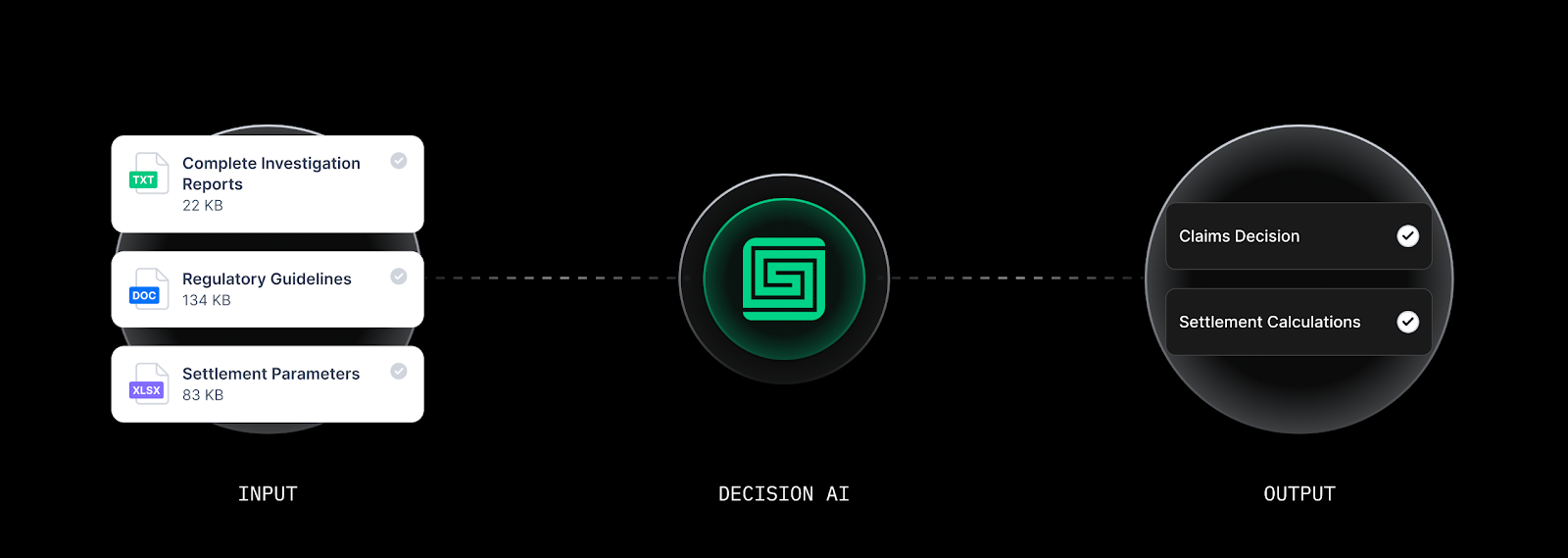
Value: Improved decision speed, audit-ready justifications, and fewer escalations. This intelligent automation improves claims accuracy and reduces backlogs.
4. Settlement and Closure
Before AgentFlow: Claims teams manually draft decision letters, enter payment details into claims systems, and compile documentation for compliance. This consumes hours of manual data entry and back-and-forth.
With AgentFlow: Report AI auto-generates settlement documentation, integrates with claims management systems, and logs every action for audit purposes. Reports are consistent, version-controlled, and traceable.
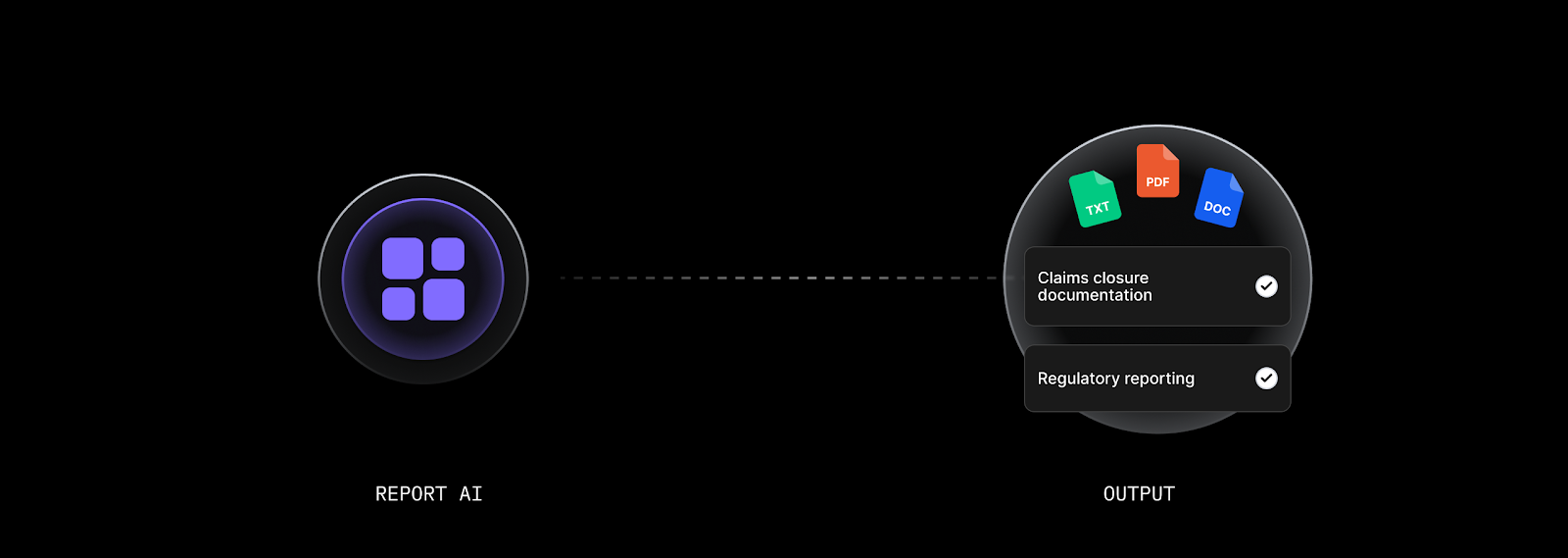
Value: Shortens closure timelines, improves data accuracy, and ensures every file meets insurance industry standards for regulatory compliance and customer satisfaction.
How AgentFlow Ensures Security, Governance, and Trust in Claims Processing
AgentFlow is designed for regulated insurance environments, where compliance, transparency, and secure infrastructure are foundational. It protects sensitive claims data, enforces auditability across workflows, and aligns with global regulatory expectations.
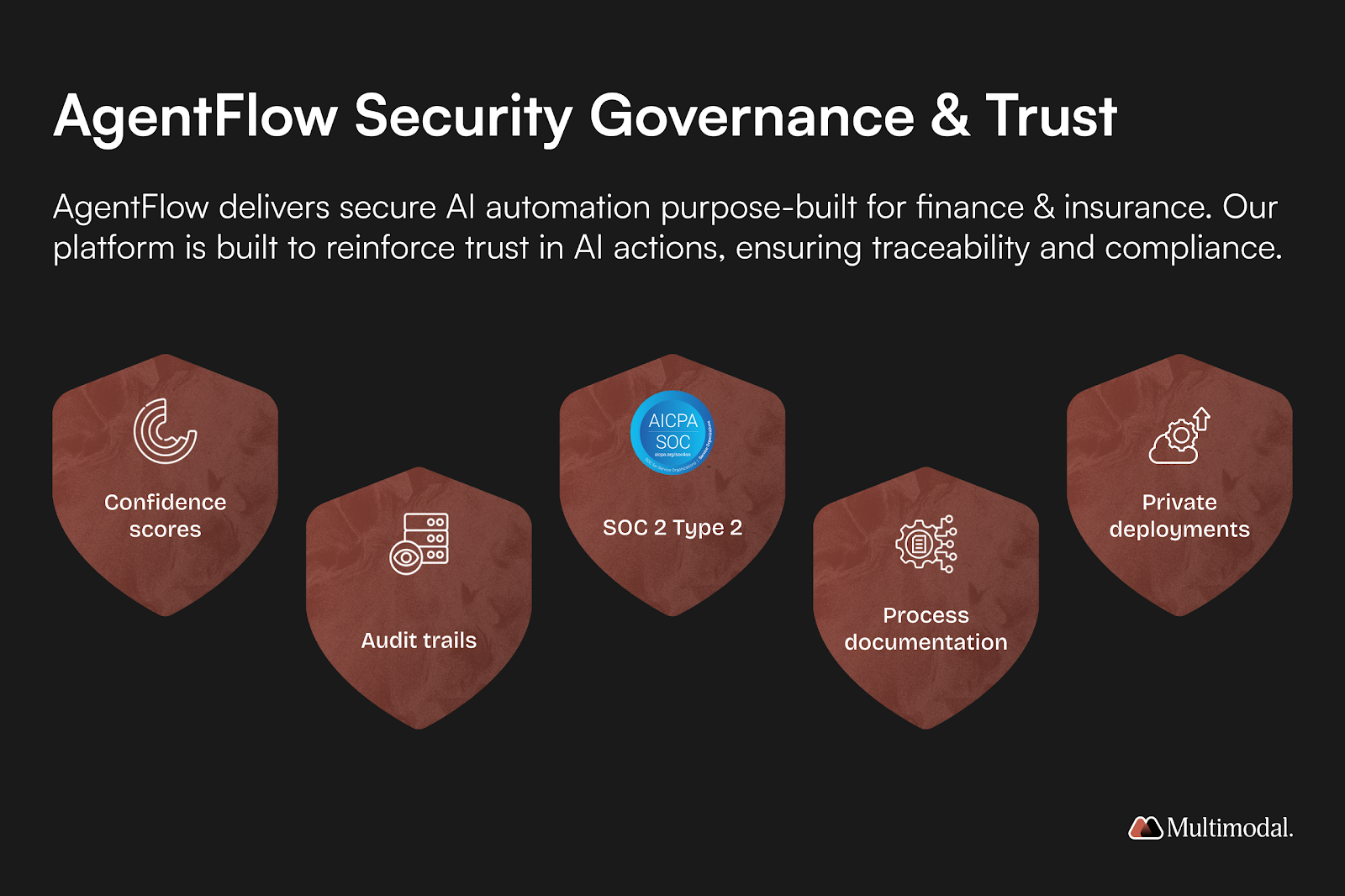
- Deploys within your infrastructure (private VPC, on-prem, or single-tenant cloud), so your data stays in your control.
- Encrypts all data using AES-256 at rest and TLS 1.3 in transit.
- Meets compliance benchmarks including SOC 2 Type II; aligned with ISO 27001 and GDPR.
- Captures full audit trails of each AI action, including input data, output, and confidence score.
- Routes low-confidence outputs to human reviewers using customizable thresholds.
- Retrains models regularly and monitors for drift to ensure long-term reliability.
- Provides explainable outputs so adjudicators and compliance officers understand the basis of every action.
Ready to Adapt Agentic AI to Your Workflow?

The example above is just one version of a modern claims process automation solution. Every insurer has unique rules, systems, and compliance demands. AgentFlow configures to your claims management process without forcing platform changes.
Our agentic AI adapts to your claims workflows, integrates with your workbench tools, and respects your regulatory context. Each AI Agent, from Document AI to Report AI, can be configured to match your internal schemas, approval logic, and documentation standards.
Book a demo today to see how your claims team can accelerate claims processing, improve consistency, and strengthen compliance with agentic AI.
FAQs
AgentFlow is Multimodal’s agentic AI platform. It combines specilaized agents like Document AI, Decision AI, Conversational AI, and Report AI to automate multi-step, regulated workflows across the insurance industry.
An agentic workflow is a series of coordinated AI agents that process claims data within human-defined guardrails. Each agent performs a step, such as extracting documents, identifying fraudulent claims, analyzing risk, or creating audit-ready reports.
Yes. AgentFlow integrates with core systems used across insurance operations, including claims management platforms, document repositories, and underwriting tools, all via secure APIs. It enhances rather than disrupts your current infrastructure.
Absolutely. By automating document processing, classification, triage, and validation, AgentFlow reduces manual data entry and repetitive tasks across the claims department.
Yes. Every action and recommendation is logged, complete with confidence scores and source traceability. It supports full transparency and aligns with SOC 2 and ISO 27001 compliance.
Yes. It’s built to support dynamic claims environments. Whether you're processing property claims, health claims, or more complex claims involving multiple policy components, AgentFlow adapts accordingly.
AgentFlow is designed for insurance firms operating in regulated environments. It encrypts all data, supports in-VPC and on-prem deployment, includes RBAC, and ensures full audit trails.
Most insurance companies go live within 6 to 12 weeks. Our team supports integration, knowledge capture, SME onboarding, and workflow automation end to end.
.svg)
.svg)